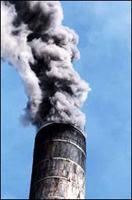
News |
- Phoenix 50 - Global Change Leaders
- Canada's Emissions Still Rising
- Government Keeps Park Development Secret
- Greener Vehicle Standards for Manitoba
- University of Winnipeg Bans Bottled Water
- Ontario Sets Toxic Law Precedent
- Insurers Must Disclose Climate Risks
- Canada's Climate Change Act Applauded
- Risk to Lake Winnipeg Continues
- Obama Signs Massive Lands Protection Act
- Coal No Longer Needed
- Global Carbon Registry
| Phoenix 50 - Global Change Leaders | 27 April 09 |
 Fifty organizations have been recognized for being the world's top pioneers in social innovation. The Phoenix 50 listing was compiled by Volans, a sustainability and social enterprise think-tank and consultancy that works to develop innovative solutions to financial, social and environmental problems. Fifty organizations have been recognized for being the world's top pioneers in social innovation. The Phoenix 50 listing was compiled by Volans, a sustainability and social enterprise think-tank and consultancy that works to develop innovative solutions to financial, social and environmental problems. The list that includes General Electric's Ecomagnination, Global Footprint Network, Climate Change Capital, Goggle, and the Obama Presidency was announced at the Skoll World Forum on Entrepreneurship in Oxford England. The forum focused on the opportunities for change presented by the economic crisis. "A new economic order is rising from the ashes, and a new generation of innovators, entrepreneurs and investors is accelerating the changes essential for delivering scalable sustainable solutions to the world," says the report. The report The Phoenix Economy: 50 Pioneers in the Business of Social Innovation highlights the 50 organizations and explores new markets, technologies and business models that provide solutions to the economic crisis. View report The Phoenix Economy: 50 Pioneers in the Business of Social Innovation (PDF)Visit Phoenix 50 website Visit The Skoll World Forum website View March 26, 2009 Skoll World Forum press release View April 10, 2009 Global Footprint Network article View March 26, 2009 Climate Change Capital press release Sources: Volans, Global Footprint Network, Climate Change Capital |
|
 Print version Print version |
Top |
| Canada's Emissions Still Rising | 27 April 09 |
 Environment Canada delivered some bad climate change news on Earth Day. New data released by the federal environmental agency shows Canada's greenhouse gas emissions continue to rise, which is further evidence Canada should be taking serious action on climate change. Environment Canada delivered some bad climate change news on Earth Day. New data released by the federal environmental agency shows Canada's greenhouse gas emissions continue to rise, which is further evidence Canada should be taking serious action on climate change.Highlights from 2007 data include:
Climate Action Network Canada and KyotoPlus partners are seeking immediate action to meet Canada's Kyoto obligations. View April 29, 2009 Globe and Mail articleView April 30, 2009 COP 15 Copenhagen article View Environment Canada report summary, Canada's 2007 Greenhouse Gas Inventory View April 23, 2009 CUPE article Visit CUPE Environment pages Sources: CUPE, Environment Canada |
|
 Print version Print version |
Top |
| Government Keeps Park Development Secret | 24 April 09 |
 Manitoba Wilderness Committee is outraged at the Manitoba government's push for a development on the shores of remote Meditation Lake in Whiteshell Provincial Park. Manitoba Wilderness Committee is outraged at the Manitoba government's push for a development on the shores of remote Meditation Lake in Whiteshell Provincial Park. Within days of the announced proposal, (made after over one year of secret meetings with the developer) the Wilderness Committee filed 10 Freedom of Information and Protection of Privacy Act (FIPPA) requests on behalf of the people of Manitoba about the proposed Meditation Lake development, including about water quality. "This is about our parks," stated Eric Reder, Campaign Director for the Wilderness Committee. "People must realize that the precious wild spaces that used to exist in Whiteshell Provincial Park are disappearing. On top of the lack of parks management planning, putting a kids camp on a lake with deadly water quality could be criminally negligent." Manitoba Wildlands director Gaile Whelan Enns commented. "Manitoba's is losing protected parklands every year, instead of establishing new protected areas. Our parks, including Whiteshell, are long overdue for management plans." The public open house is at 7 p.m. Thursday April 30th at Victoria Inn, Winnipeg. Take Action with the Wilderness Committee, send a letter and read the updatesView April 24, 2009 Manitoba Wilderness Committee news release (PDF) View Manitoba Wildlands Meditation Lake with Gravel Reserves and Mining Map View Manitoba Wildlands Meditation Lake, East Side Parks Map Visit Manitoba Wilderness Committee website View Manitoba Conservation's Parks consultation page Sources: Wilderness Committee, Manitoba Wildlands |
|
 Print version Print version |
Top |
| Greener Vehicle Standards for Manitoba | 21 April 09 |
 Manitoba's Vehicle Standard Advisory Board has issued a report advising Manitoba to reduce vehicle emissions. Science, Technology, Energy and Mines Minister Jim Rondeau said the province will immediately implement an action plan based on the board's findings. Manitoba's Vehicle Standard Advisory Board has issued a report advising Manitoba to reduce vehicle emissions. Science, Technology, Energy and Mines Minister Jim Rondeau said the province will immediately implement an action plan based on the board's findings.The report, Reducing Greenhouse Gas Emissions from Passenger Vehicles in Manitoba supports aggressive vehicle emission reduction targets and incentives to get older cars off the road. A suggested new public education campaign - Green Driving, would promote increased fuel efficiency through regular vehicle maintenance and driving habits including tips on anti-idling. The government will also provide support for a new rapid transit corridor for the city of Winnipeg. The board was formed under Manitoba's new Climate Change and Emissions Reduction Act. Minister Rondeau said the province supports the proposed California Air Resources Board model for vehicle emission reductions. The government implementation plan includes introducing the California Air Resources Board model for emission reductions pending approval in the United States and economic analysis on the impact on retailers in Manitoba. View April 2, 2009 Manitoba Government press releaseView January 30, 2009 report, Moving Forward - Reducing Greenhouse Gas Emissions from Passenger Vehicles in Manitoba (PDF) View April 2, 2009 CBC article View April 2, 2009 Winnipeg Free Press article View April 7, 2009 EcoSilly article View April 7, 2009 Canadian Driver article View March 2009 PEW Centre on Global Climate Change article Sources: Government of Manitoba, CBC, Winnipeg Free Press, EcoSilly, Canadian Driver |
|
 Print version Print version |
Top |
| University of Winnipeg Bans Bottled Water | 21 April 09 |
 The University of Winnipeg is the first university in Canada to ban bottled water on campus. In a student initiated referendum 74.8 percent of students voted against sale of bottled water, which will be phased out by the fall 2009 semester. The University of Winnipeg is the first university in Canada to ban bottled water on campus. In a student initiated referendum 74.8 percent of students voted against sale of bottled water, which will be phased out by the fall 2009 semester. The ban was a result of an ongoing national student campaign organized by the Polaris Institute, the Canadian Federation of Students, and Sierra Youth Coalition. To date, 21 universities and colleges have established over 50 bottled water free zones. "Our campuses need to lead the way on sustainability initiatives" said David Jacks, Manitoba Chairperson for the Canadian Federation of Students, "it is our hope that other institutions across Canada will take similar action, and enshrine public drinking water as a Right by refusing to accept water as a commodity". In a 2008 national online survey of universities and colleges - respondents indicated a lack of access to clean, potable water and rapidly decaying water fountains. The University of Winnipeg will now be upgrading water infrastructure on campus and installing new water fountains. View March 23, 2009 Polaris Institute articleView Polaris Institute report, Corporate Initiatives on Campus: A 2008 Snapshot View March 23, 2009 University of Winnipeg press release View March 30, 2009 Solid Waste Management article Sources: Polaris Institute, University of Winnipeg, Solid Waste Management |
|
 Print version Print version |
Top |
| Ontario Sets Toxic Law Precedent | 21 April 09 |
 The Ontario government's proposed new legislation will reduce toxic substances by requiring facilities to report and track releases and uses. According to Pollution Watch, Ontario emits more cancer-causing chemicals into the air than any other province. The Ontario government's proposed new legislation will reduce toxic substances by requiring facilities to report and track releases and uses. According to Pollution Watch, Ontario emits more cancer-causing chemicals into the air than any other province.If approved the Toxic Reduction Act 2009 would require facilities to provide a plan for toxic use reduction. This requirement in the legislation is completely voluntary. "It sounds troublesome," said Aaron Freeman, policy director with Environmental Defence "but a model of mandatory reporting and then voluntary target-setting actually works very well." The voluntary approach is modeled after Massachusett's Toxic Use Reduction Act which saw a 91 percent reduction in environmental releases and 64 percent reduction in toxic waste. Ontario will invest $24 million to help industries transform their processes and move away from toxic substance use. View April 7, 2009 Ontario Ministry of the Environment press releaseView Backgrounder: The Proposed Toxics Reduction Act Planned Consultations and Next Steps (PDF) View April 8, 2009 CBC article View April 7, 2009 Environmental Defence press release View April 8, 2009 Environmental News Service article View April 8, 2009 The Hamilton Spectator article Sources: Ontario Ministry of the Environment, CBC, Environmental Defence, Environmental News Service, The Hamilton Spectator |
|
 Print version Print version |
Top |
| Insurers Must Disclose Climate Risks | 21 April 09 |
 For the first time, US insurance companies are required to tell regulators about financial risks brought on by climate change and what they are doing to respond to those risks. For the first time, US insurance companies are required to tell regulators about financial risks brought on by climate change and what they are doing to respond to those risks. The National Association of Insurance Commissioners (NAIC) now requires large property and life insurance companies with premiums of more than $500 million to file an Insurer Climate Risk Disclosure Survey annually, beginning May 1, 2010. "Climate change will have huge impacts on the insurance industry and we need better information on how insurers are responding to the challenge," said Joel Ario, chair of the NAIC Climate Change and Global Warming Task Force. The eight-question survey will help regulators assess the exposure to risk from extreme weather events linked to climate change, such as wildfires, drought or flooding. The new mandate from NAIC was adopted following the third most expensive year on record for the insurance industry due to catastrophic damage attributed to climate change. View March 19, 2009 Green Biz articleView March 23, 2009 Insurance News Net article View March 19, 2009 Environmental Leader article View January 6, 2009 Environmental Leader article Sources: Green Biz, Insurance News Net, Environmental Leader |
|
 Print version Print version |
Top |
| Canada's Climate Change Act Applauded | 16 April 09 |
 The groundbreaking Bill C-311 passed second reading in the House of Commons earlier this month. The Climate Change Accountability Act sets science-based reduction targets for greenhouse gas emissions needed to avoid dangerous climate change. The groundbreaking Bill C-311 passed second reading in the House of Commons earlier this month. The Climate Change Accountability Act sets science-based reduction targets for greenhouse gas emissions needed to avoid dangerous climate change.Targets contained in the bill will reduce Canadian GHG emissions by 25 percent below 1990 levels by 2020, and 80 percent below 1990 levels by 2050. It requires the government to make regulations to meet reduction targets and requires the Minister of Environment to produce a plan outlining how targets will be achieved. "This Act will demonstrate strong leadership by Canada at a critical time for international action at climate talks in Copenhagen later this year." said Gaile Whelan Enns, Director of Manitoba Wildlands. Sierra Club Canada encouraged Members of Parliament to vote for the bill, which passed by 141-128. The standing committee on the environment has 60 days to review the bill and propose any changes before it goes back to the House for a third and final vote. View Bill C-311, An Act to ensure Canada assumes its responsibilities in preventing dangerous climate changeView Sierra Club Canada Climate Crisis website View March 31, 2009 Sierra Club Canada article View April 2, 2009 CBC article View April 2, 2009 David Suzuki article View April 1, 2009 Sierra Club Canada article View April 1, 2009 Pembina Institute article Sources: Government of Canada, Sierra Club, CBC, David Suzuki Foundation, Sierra Club Canada, Pembina Institute |
|
 Print version Print version |
Top |
| Risk to Lake Winnipeg Continues | 15 April 09 |
 Manitoba's Clean Environment Commission has identified phosphorus removal as the leading contributor to blue-green algae growth in Lake Winnipeg. Wastewater treatment for the City of Winnipeg was the subject of the referral from Manitoba Conservation to the CEC for investigation, based on a request from the City of Winnipeg for a review of earlier CEC recommendations. Manitoba's Clean Environment Commission has identified phosphorus removal as the leading contributor to blue-green algae growth in Lake Winnipeg. Wastewater treatment for the City of Winnipeg was the subject of the referral from Manitoba Conservation to the CEC for investigation, based on a request from the City of Winnipeg for a review of earlier CEC recommendations.The CEC's report reaffirms its 2003 recommendation for Winnipeg's wastewater treatment system that it is critical to also reduce ammonia and nitrogen because they are toxic to fish and degrade water quality. The city is required to meet its licensing and wastewater treatment requirements despite concerns that nitrogen removal might be an unneeded cost. The scientific community advised the Manitoba government to focus on phosphorus, and not nitrogen for urban wastewater treatment in relation to the health of Lake Winnipeg. The 2003 investigation by the CEC occurred due to the huge cost to Winnipeggers to remove phosphorus and nitrogen before wastewater reaches Lake Winnipeg, and fines imposed by Environment Canada. "While we know which commissioners participated in this review, we do not know which outside experts the CEC used, and the 2008 report the CEC used, An Assessment of Cost of Nitrogen Removal of City of Winnipeg Wastewater, does not appear to be public. We hope the CEC standards for access to information improve," commented Gaile Whelan Enns of Manitoba Wildlands. View March 26, 2009 Manitoba Government press releaseView April 5, 2009 Winnipeg Free Press letter to the Editor View March 26, 2009 Manitoba Government press release View March 26, 2009 Winnipeg Free Press article View March 27, 2009 Winnipeg Free Press article View March 2009 Manitoba CEC Final Report, An investigation into nutrient reduction and ammonia treatment at the City of Winnipeg's wastewater treatment facilities (PDF) View Manitoba Public Registry, City of Winnipeg's Waste Collection and Treatment System Review Sources: Government of Manitoba, Winnipeg Free Press, CEC |
|
 Print version Print version |
Top |
| Obama Signs Massive Lands Protection Act | 15 April 09 |
 President Barack Obama has signed the most significant piece of conservation and public lands management legislation in decades that will protect over two million acres of wilderness across nine states. President Barack Obama has signed the most significant piece of conservation and public lands management legislation in decades that will protect over two million acres of wilderness across nine states. The Omnibus Public Lands Management Act of 2009 is a compilation of a giant package of 164 separate bills. It establishes 10 new National Heritage Sites, national trails, 21 new wilderness areas and expands several national park boundaries. It also provides the highest level of government protection from logging and commercial development. "This legislation guarantees that we will not take our forests, rivers, oceans, national parks, monuments, and wilderness areas for granted, but rather we will set them aside and guard their sanctity for everyone to share," Obama said while signing the Act. The act protects thousands of kilometers of rivers with 86 new Wild and Scenic Rivers and provides legal status for the National Landscape Conservation System, which contains areas of archaeological and cultural significance. New and expanded areas offer protection for critical fish and wildlife habitat. View US Omnibus Public Lands Management Act of 2009 Text (PDF)View March 30, 2009 White House Blog View March 30, 2009 Environmental News Service article View March 30, 2009 CNN article View March 31, 2009 Washington Post article View March 30, 2009 Associated Free Press article View March 30, 2009 Sierra Club release View March 25, 2009 NRDC article Sources: Environmental News Service, CNN, The Washington Post, Associated Free Press |
|
 Print version Print version |
Top |
| Coal No Longer Needed | 15 April 09 |
 The Move Beyond Coal campaign from Sierra Club US aims to stop new coal power plants and drive investment towards clean energy alternatives. The Move Beyond Coal campaign from Sierra Club US aims to stop new coal power plants and drive investment towards clean energy alternatives. Campaign Director Bruce Nilles helped coordinate a successful grassroots movement and was declared Grists 2008 Eco-Hero of the year for his efforts. The Sierra Club US claims to have stopped 24 new coal plants in the U.S. last year, for a total of 95 coal plants defeated or abandoned since the beginning of the recent coal rush. Coal is becoming an increasingly risky energy option, as coal plants will soon be required to account for their global warming pollution. According to the Energy Information Administrations Annual Energy Outlook Report the US needs only two new coal plants between 2013 and 2025. Government findings clearly dispute the coal industrys call for dozens of new plants. In 2008 the coal industry spent close to $50 million on ads to sway public support for more "clean" coal-fired power plants. View Move Beyond Coal websiteView March 31, 2009 Sierra Club article View February 13, 2009 Grist article View March 31, 2009 Its Getting Hot In Here article View NRDC - Coal is Dirty and Dangerous website View US Department of Energy - Annual Energy Outlook 2009 (PDF) Sources: Sierra Club, Grist, Its Getting Hot in Here, NRDC, United States Department of Energy |
|
 Print version Print version |
Top |
| Global Carbon Registry | 15 April 09 |
 The Voluntary Carbon Association has launched a global multiple registry system to allow trading of carbon emission offsets across registries. The system will save buyers from opening multiple accounts with different registries and ensure offsets are not double sold. The Voluntary Carbon Association has launched a global multiple registry system to allow trading of carbon emission offsets across registries. The system will save buyers from opening multiple accounts with different registries and ensure offsets are not double sold.The key feature to allow voluntary carbon units (VCUs) to be traded across registries has been delayed but once up and running the Voluntary Carbon Standard Registry will be able to issue, transfer and retire voluntary carbon units. "The VCS Registry is a significant milestone for the voluntary carbon market. In order to grow, this market needs credible, financial markets based registries such as the TZ1 Registry," said Lisa Ashford, Global Head of Voluntary and New Markets, EcoSecurities. Carbon offsets enables companies to compensate for unavoidable greenhouse gas emissions. The carbon offsetting market was worth around $330 million in 2007. View March 18, 2009 PlanetArk articleView March 18, 2009 Mondo Visione article View March 18, 2009 Sustainable Business article View March 17, 2009 Environmental Leader article Sources: Reuters, Mondo Visione, Sustainable Business, Environmental Leader |
|
 Print version Print version |
Top |


 RSS Feeds:
RSS Feeds: